For the 2025 school year, there are 2 public middle schools serving 88 students in Castlewood School District 28-1. This district's average middle testing ranking is 7/10, which is in the top 50% of public middle schools in South Dakota.
Public Middle Schools in Castlewood School District 28-1 have an average math proficiency score of 47% (versus the South Dakota public middle school average of 39%), and reading proficiency score of 52% (versus the 49% statewide average).
Minority enrollment is 7% of the student body (majority Hispanic), which is less than the South Dakota public middle school average of 42% (majority American Indian).
Overview
This School District
This State (SD)
# Schools
4 Schools
297 Schools
# Students
338 Students
40,141 Students
# Teachers
23 Teachers
2,999 Teachers
Student : Teacher Ratio
15:1
15:1
District Rank
Castlewood School District 28-1, which is ranked within the top 50% of all 146 school districts in South Dakota (based off of combined math and reading proficiency testing data) for the 2021-2022 school year.
The school district's graduation rate of 80% has stayed relatively flat over five school years.
Overall District Rank
#48 out of 148 school districts
(Top 50%)
(Top 50%)
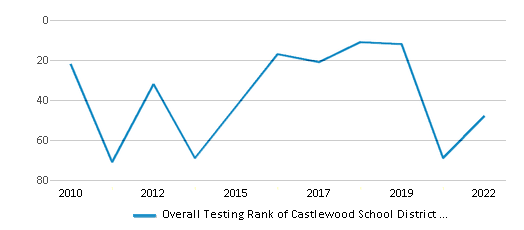
Math Test Scores (% Proficient)
50-54%
42%
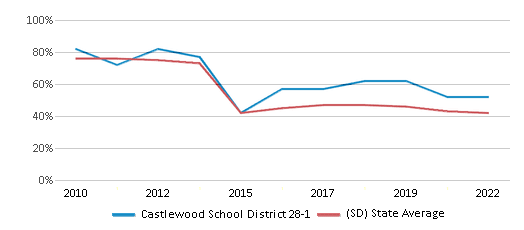
Reading/Language Arts Test Scores (% Proficient)
50-54%
51%
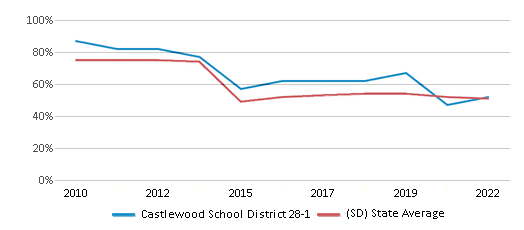
Science Test Scores (% Proficient)
30-34%
42%
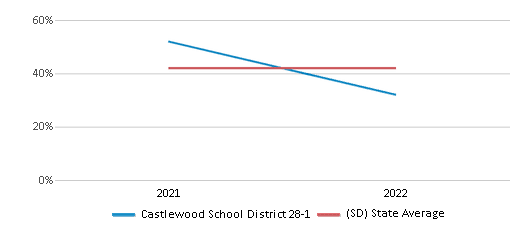
Graduation Rate
≥80%
82%
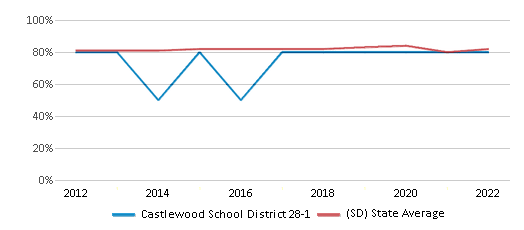
Students by Ethnicity:
Diversity Score
0.13
0.59
# American Indian Students
n/a
10,455 Students
% American Indian Students
n/a
26%
# Asian Students
n/a
519 Students
% Asian Students
n/a
1%
# Hispanic Students
18 Students
2,703 Students
% Hispanic Students
5%
7%
# Black Students
n/a
1,024 Students
% Black Students
n/a
3%
# White Students
315 Students
23,358 Students
% White Students
93%
58%
# Hawaiian Students
n/a
46 Students
% Hawaiian Students
n/a
n/a
# Two or more races Students
5 Students
2,036 Students
% of Two or more races Students
2%
5%
Students by Grade:
# Students in PK Grade:
18
174
# Students in K Grade:
17
896
# Students in 1st Grade:
28
903
# Students in 2nd Grade:
22
918
# Students in 3rd Grade:
18
750
# Students in 4th Grade:
24
793
# Students in 5th Grade:
28
1,598
# Students in 6th Grade:
25
9,664
# Students in 7th Grade:
24
11,058
# Students in 8th Grade:
28
11,237
# Students in 9th Grade:
28
674
# Students in 10th Grade:
29
578
# Students in 11th Grade:
23
481
# Students in 12th Grade:
26
417
# Ungraded Students:
-
-
District Revenue and Spending
The revenue/student of $11,376 in this school district is less than the state median of $13,121. The school district revenue/student has stayed relatively flat over four school years.
The school district's spending/student of $10,544 is less than the state median of $12,623. The school district spending/student has stayed relatively flat over four school years.
Total Revenue
$4 MM
$1,916 MM
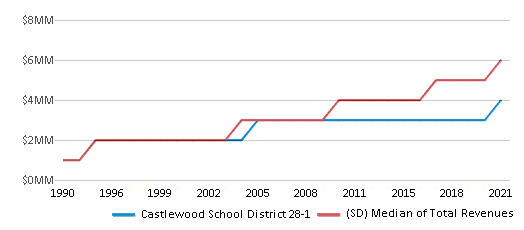
Spending
$4 MM
$1,844 MM
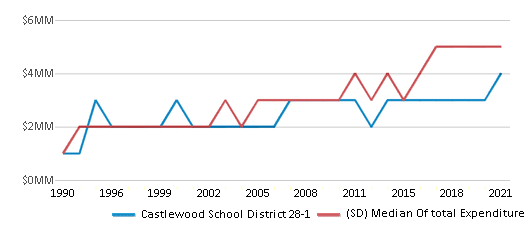
Revenue / Student
$11,376
$13,121
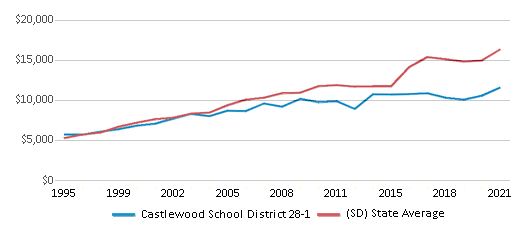
Spending / Student
$10,544
$12,623
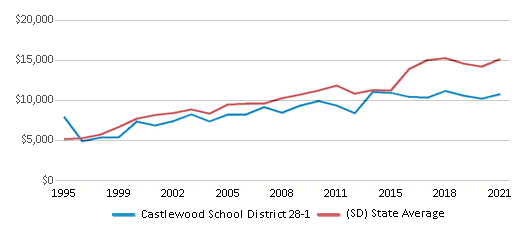
Best Castlewood School District 28-1 Public Middle Schools (2025)
School
(Math and Reading Proficiency)
(Math and Reading Proficiency)
Location
Grades
Students
Rank: #11.
Claremont Colony Elementary - 04
(Math: <50% | Reading: <50%)
Rank:
Rank:
6/
Top 50%10
46271 184th St
Castlewood, SD 57223
(605) 793-2497
Castlewood, SD 57223
(605) 793-2497
Grades: K-8
| 15 students
Rank: #22.
Castlewood Middle School - 03
(Math: 45-49% | Reading: 50-54%)
Rank:
Rank:
6/
Top 50%10
310 E Harry St
Castlewood, SD 57223
(605) 793-2497
Castlewood, SD 57223
(605) 793-2497
Grades: 6-8
| 73 students
Recent Articles

Sexual Harassment at Age 6: The Tale of a First Grade Suspension
A six-year old in Aurora, Colorado, was suspended after singing an LMFAO song to a little girl in his class and reportedly “shaking his booty.” We look at the case and the sexual harassment problem in public schools today.

How Scaffolding Could Change the Way Your Child Learns
This article explores the concept of instructional scaffolding, a teaching method that enhances learning by breaking down complex tasks into manageable parts. It highlights how scaffolding supports students in developing critical thinking skills and becoming more independent learners. The article discusses the benefits of scaffolding, including improved engagement and reduced anxiety, and provides strategies for its implementation across various educational levels.

February 05, 2025
Understanding the U.S. Department of Education: Structure, Impact, and EvolutionWe explore how the Department of Education shapes American education, from its cabinet-level leadership to its impact on millions of students, written for general audiences seeking clarity on this vital institution.





